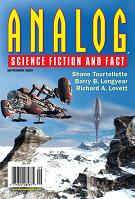 “Evergreen” by Shane Tourtellotte
“Evergreen” by Shane Tourtellotte
“From the Ground Up” by Marie DesJardin
“Attitude Adjustment” by Eric James Stone
“The Last Resort” by Alec Nevala-Lee
“Turning the Grain” Part 2 of 2 by Barry B. Longyear
Reviewed by Bob Blough
Analog is, among other things, an ideas-oriented magazine. These “idea” stories extrapolate current scientific thought and place the ideas, breakthroughs, or theoretical advances at the heart of situations that illuminate the central technological question and how it might affect current, or established, moral, ethical, religious, legal, or philosophical concerns. This issue follows that pattern very well.
The year is 2057 and Andrew is a 27-year-old in a pre-pubescent body. His parents have “frozen” him–-gene tweaked in the womb–so as not to grow past a certain age. This is helpful for several reasons; longevity of life, flexibility in thought and so on. Andrew is angry however to be just a child who is not allowed to grow up. He has denounced his parents and become an activist for the anti-frozen cause.
In the course of his work he meets a “frozen” girl who seems happy with her life. Her situation is overwhelmingly positive for her. It is the push and pull of these two twenty-somethings frozen before puberty that propels the story.
Alice is an accomplished musician who lives with her mother and father, while Andrew lives on his own. He is planning to move to the “Evergreen” of the title, which is the first living complex built specifically for the needs of adults that physically are children. The dislike/attraction between Andrew and Alice is well realized and holds reader interest, for their opposing world views clash in a very human way, relating in human terms both sides of the question the new technology and the possible reactions to its use may engender, and with which we can all relate.
This is not a totally new idea but Shane Tourtellotte in his engaging and well-wrought novelette has thought thorough the implications of such a technology and how it affects human beings who have been subjected to it. The prose is perfectly adequate to the task, and the characters are nicely fleshed out, but it is the interesting change in culture that in the end is most satisfying. This is the best story in this issue.
In “From the Ground Up” by Marie DesJardin, young Carrie has witnessed the crash of a tiny alien spaceship on her family’s Minnesota farm. That she was unable to help the aliens and only watched as their tiny squirmings ceased and they perished, has affected her deeply. As some sort of personal atonement for the guilt she feels, she joins NASA’s astronaut program as an adult. At a mere four pages, “From the Ground Up” shows how sometimes we do get second chances, and promises more enjoyable stories from the author.
“Attitude Adjustment” by Eric James Stone is a six page story detailing the plight of a tourist “bus” of the future. Danica, the tour guide, is piloting a ship full of tourists on a sight-seeing trip to the far side of the moon when the onboard computer and attitude control systems are disabled. How they work themselves out of this predicament using the physics inherent in the situation is the gist of the story. These “problem solving” stories are not my cup of tea but this is a scientifically plausible one.
Alec Nevala-Lee in “The Last Resort” creates an interesting story about compromise versus zealotry, and finds both wanting. The two protagonists are Helki, a herpetologist who once fought to protect ecological niches using a method she has now forsaken, and who now has joined the “other” side to “fight from the inside,” and Russell, an eco-terrorist who is willing for lives to be lost in order to make his point.
From the opening sequence when the two meet, through a scene of snakes in a mating frenzy, to a bombing and the silent pall of death, Nevala-Lee presents a balanced view of the opposing philosophies. There are no good guy/bad guy situations here. It is a refreshingly un-biased story with a lot of suspense.
We also have the concluding installment of Barry B. Longyear’s “Turning the Grain.”
So, the September issue of Analog is definitely a worthwhile read, with Shane Tourtellotte’s “Evergreen” taking top honors this time around.